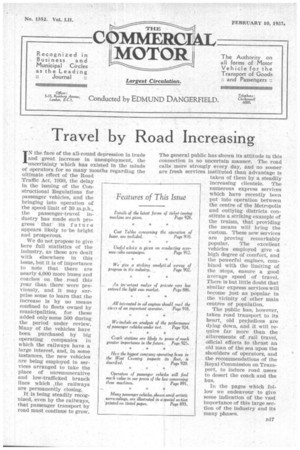Travel by Road Increasing
Page 79

If you've noticed an error in this article please click here to report it so we can fix it.
IN the face of the all-round depression in trade and great increase in unemployment, the uncertainty which has existed in the minds of operators for so many months regarding the ultimate effect of the Road
Traffic Act, 1930, the delay
in the issuing of the Constructional Regulations for passenger vehicles, and the bringing into operation of the speed limit of 30.m.p.1s., the passenger-travel industry has made such progress that its future appears likely to -be bright and prosperous.
We do not propose to give here full statistics of the industry, as these are dealt with elsewhere in this issue, but it is of importance to note that there are nearly 4,000 more buses and coaches on the road this year than there were previously, and it may surprise some to learn that the increase is by no means confined to fleets owned by municipalities, for these added only some 500 during the period under review. Many of the vehicles have been purchased by big operating companies in which the railways have a large interest, and, in some instances, the new vehicles are being employed in services arranged to take the place of unremunerative and low-trafficked branch lines which the railways are permanently closing.
It is being steadily recognized, even by the railways, that passenger transport by road must continue to grow. The general public has shown its attitude in this connection in no uncertain manner. The road . calls more strongly every day, and no sooner are fresh services instituted than advantage is taken of them by a steadily increasing clientele. The
1
numerous express services which have recently been put into operation between the centre of the Metropolis and outlying districts constitute a striking example of the truism, that providing the means will bring the custom. These new Services are proving remarkably popular. The excellent vehicles employed give • a high degree of comfort, and the powerful engines, combined with the limiting of the stops, ensure a good average speed of travel. There is but little doubt that similar express services will become just• as popular in the vicinity of other main centres of population.
The public has; however, taken road transport to its heart, old prejudices are dying down, and it will require far more than the allurements of rail travel, official efforts to thrust an old man of the sea upon the shoulders of operators, and the recommendations of the Royal Commission on Transport, to induce road users to desert the coach and the bus.
In the pages which follow we endeavour to give some indication of the vast importance of this large section of the industry and its many phases.




























































































































































































